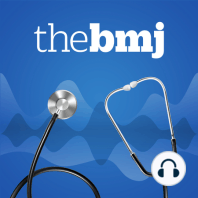27 min listen
Talk Evidence - health checks, abx courses and p-values
FromThe BMJ Podcast
ratings:
Length:
48 minutes
Released:
Apr 17, 2019
Format:
Podcast episode
Description
Helen Macdonald and Carl Heneghan are back again talking about what's happened in the world of evidence this month.
(1.20) Carl grinds his gears over general health checks, with an update in the Cochrane Library.
(9.15) Helen is surprised by new research which looks at over prescription of antibiotics - but this time because the courses prescribed are far longer than guidelines suggest.
(22.30) What is the true 99th centile of high sensitivity cardiac troponin in hospital patients?
(29.02) Is it time to abandon statistical significance and be aware of the problem of the transposed conditional.
Reading list:
General health checks in adults for reducing morbidity and mortality from disease - https://www.ncbi.nlm.nih.gov/pubmed/30699470?dopt=Abstract
Duration of antibiotic treatment for common infections in English primary care -https://www.bmj.com/content/364/bmj.l440
True 99th centile of high sensitivity cardiac troponin for hospital patients - https://www.bmj.com/content/364/bmj.l440
Significant debate - https://www.nature.com/magazine-assets/d41586-019-00874-8/d41586-019-00874-8.pdf
The false positive risk: a proposal concerning what to do about p-values - https://www.youtube.com/watch?v=jZWgijUnIxI
http://www.onemol.org.uk/?page_id=456
(1.20) Carl grinds his gears over general health checks, with an update in the Cochrane Library.
(9.15) Helen is surprised by new research which looks at over prescription of antibiotics - but this time because the courses prescribed are far longer than guidelines suggest.
(22.30) What is the true 99th centile of high sensitivity cardiac troponin in hospital patients?
(29.02) Is it time to abandon statistical significance and be aware of the problem of the transposed conditional.
Reading list:
General health checks in adults for reducing morbidity and mortality from disease - https://www.ncbi.nlm.nih.gov/pubmed/30699470?dopt=Abstract
Duration of antibiotic treatment for common infections in English primary care -https://www.bmj.com/content/364/bmj.l440
True 99th centile of high sensitivity cardiac troponin for hospital patients - https://www.bmj.com/content/364/bmj.l440
Significant debate - https://www.nature.com/magazine-assets/d41586-019-00874-8/d41586-019-00874-8.pdf
The false positive risk: a proposal concerning what to do about p-values - https://www.youtube.com/watch?v=jZWgijUnIxI
http://www.onemol.org.uk/?page_id=456
Released:
Apr 17, 2019
Format:
Podcast episode
Titles in the series (100)
Plain Packaging: Plain packaging on tobacco products is the latest strategy aimed at reducing smoking. Campaigners had hoped the UK would follow Australia’s example. But they have been disappointed as the UK government postpones the plans until “more evidence” is ava... by The BMJ Podcast
